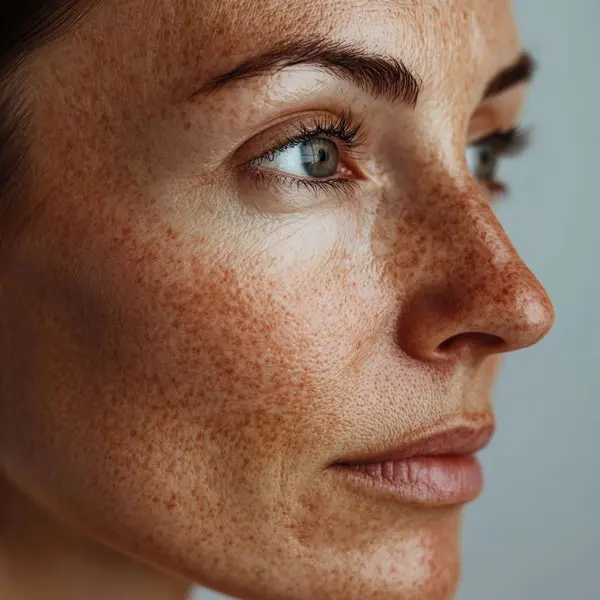When Skin Changes During Pregnancy
It’s completely natural to notice changes in your skin during pregnancy. Many people experience dark patches or uneven tone — a condition often called melasma or skin pigmentation in pregnancy. These spots usually appear on the face, especially around the cheeks and forehead. While harmless, they can sometimes affect how you feel about your appearance. That’s why many wonder whether pigmentation treatment during pregnancy is safe, or if it’s better to wait.
Before considering any procedure, it’s important to understand what causes these changes and which options are gentle and pregnancy-safe.

Understanding Pigmentation and Safe Treatments During Pregnancy
Pregnancy triggers hormonal fluctuations that increase melanin production — the pigment that gives skin its colour. As a result, darker patches may develop even if you’ve never had pigmentation before.
Sun exposure can make it more visible, so wearing broad-spectrum sunscreen daily and using a hat outdoors are simple yet effective preventive steps. In most cases, pigmentation fades gradually after childbirth, though sometimes mild marks can remain.
Therefore, focusing on protection and nourishment is more beneficial than attempting aggressive treatments during this period.
Is Pigmentation Treatment During Pregnancy Safe?
In general, professional pigmentation removal treatments — such as Pigmentation Removal
or Chemical Peels
— are not recommended during pregnancy. That’s because some ingredients or light-based technologies haven’t been fully tested for safety in expectant mothers.
However, that doesn’t mean you have no options. You can still keep your skin healthy and balanced through gentle, hydrating care and preventive protection. Using mild cleansers, pregnancy-safe serums, and mineral sunscreens helps support the skin’s barrier and prevents further darkening.
What About While Breastfeeding?
Once breastfeeding begins, some professional treatments can slowly be reintroduced — under expert supervision.
For example, light and non-invasive options such as HydraFacial
or Laser Skin Rejuvenation
may help even out tone without harsh chemicals.
Still, every skin type is different. Therefore, a personalised consultation with a qualified clinician is essential to choose the safest and most effective plan.

Safe Alternatives and Gentle Options
If you’re waiting to start pigmentation treatment, these gentle measures can make a real difference:
- Hydration: Keep your skin moisturised with products rich in hyaluronic acid or ceramides.
- Sun Protection: Use high-SPF mineral sunscreen daily — even indoors.
- Brightening Ingredients: Consider pregnancy-safe options like niacinamide or vitamin C.
- Postpartum Treatments: Once cleared by your doctor, you may explore Radiofrequency Skin Needling
or mild Chemical Peels to restore brightness and improve texture gradually.
As a result, these steps not only help reduce pigmentation safely but also keep your complexion healthy throughout and after pregnancy.
Medix Skincare’s Personalised and Modern Approach
At Medix Skincare & Laser Clinic in Melbourne, every treatment is designed with care, science, and safety in mind. Our clinicians understand how hormonal changes affect your skin and offer guidance that aligns with each stage of motherhood.
Using advanced technologies such as Pigmentation Removal, Laser Skin Rejuvenation, and HydraFacial, we customise each plan to your comfort and timing. Importantly, all options are discussed thoroughly to ensure they’re suitable for your pregnancy or postpartum phase.
Moreover, Medix prioritises gentle rejuvenation — focusing on restoring your skin’s natural glow without unnecessary risk.
Service reservation
Book a consultation today and let’s create a personalised plan to safely restore your skin’s brightness and balance — during or after pregnancy.
Contact Medix Clinic
For more information, feel free to contact us at 03 9686 0003.
You can also visit our clinic at 1/367A Centre Road, Bentleigh, Victoria 3204.
Click here to view our location on Google Maps.
About Medix Skincare and Laser Clinic in Melbourne
Every skin journey is unique — and motherhood makes it even more special. If pigmentation is affecting your confidence, you don’t have to face it alone.
Book a personalised consultation at Medix Skincare & Laser Clinic in Melbourne to explore safe, evidence-based solutions for your skin’s needs. Together, we’ll help your complexion feel brighter, smoother, and more balanced — safely and confidently.
Your skin deserves care that grows with you.
FAQ About pigmentation treatment during pregnancy
No, it’s generally not recommended. However, your skin can stay healthy with gentle care and sun protection until treatment becomes safe.
Usually, you can begin a few months after delivery, once your hormones stabilise. Therefore, it’s best to consult your clinician first.
Yes, there are. You can use mineral sunscreen, mild cleansers, and pregnancy-safe brightening ingredients like vitamin C or niacinamide.
Some gentle treatments like HydraFacial may be suitable while breastfeeding. Still, it’s essential to get approval from your skin specialist.
In many cases, yes. Over time, hormonal balance improves, and the spots fade naturally. However, professional care can speed up the process.


